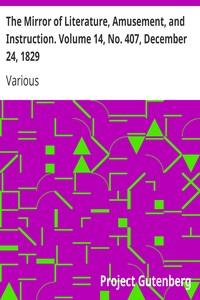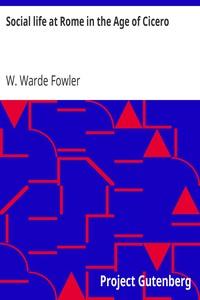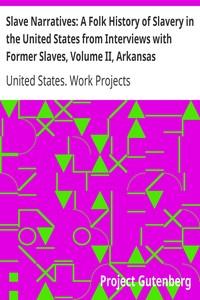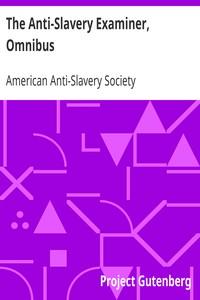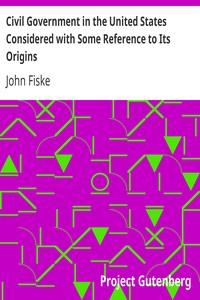|
|
Read this ebook for free! No credit card needed, absolutely nothing to pay.Words: 10682 in 4 pages
This is an ebook sharing website. You can read the uploaded ebooks for free here. No credit cards needed, nothing to pay. If you want to own a digital copy of the ebook, or want to read offline with your favorite ebook-reader, then you can choose to buy and download the ebook.

: The Mirror of Literature Amusement and Instruction. Volume 14 No. 407 December 24 1829 by Various - Popular literature Great Britain Periodicals The Mirror of Literature Amusement and Instruction@FreeBooksTue 06 Jun, 2023 THE MIRROR OF LITERATURE, AMUSEMENT, AND INSTRUCTION. Cheap Books, we hope, will never be an evil; for, as "the same care and toil that raise a dish of peas at Christmas, would give bread to a whole family during six months;" so the expense of a gay volume at this season will furnish a moderate circle with amusive reading for a twelvemonth. We do not draw this comparison invidiously, but merely to illustrate the advantages of literary economy. A proportionate Index will guide our accustomed readers to any particular article in the present volume; but for those of shorter acquaintance, a slight reference to its principal points may be useful. Besides, a few of its delights may have been choked by weeds and crosses, and their recollection lost amidst the lights and shadows of busy life. The zeal of our Correspondents is first entitled to honourable mention; and many of their contributions to these pages must have cost them much time and research; for which we beg them to accept our best thanks. Owen Feltham would call this "a cart-rope" Preface: therefore, with promises of future exertion, we hope our next Seven Years may be as successful as the past. MEMOIR OF THOMAS CAMPBELL, ESQ. Of the subject of this memoir, it has been remarked, "that he has not, that we know of, written one line, which, dying, he could wish to blot." These few words will better illustrate the fitness of Mr. Campbell's portrait for our volume, than a laudatory memoir of many pages. He has not inaptly been styled the Tyrtaeus of modern English poetry, and one of the most chaste and tender as well as original of poets. He owes less than any other British poet to his predecessors and contemporaries. He has lived to see his lines quoted like those of earlier poets in the literature of his day, lisped by children, and sung at public festivals. The war-odes of Campbell have scarcely anything to match them in-the English language for energy and fire, while their condensation and the felicitous selection of their versification are in remarkable harmony. Campbell, in allusion to Cymon, has been said to have "conquered both on land and sea," from his Naval Odes and "Hohenlinden" embracing both scenes of warfare. Scotland gave birth to Thomas Campbell. He is the son of a second marriage, and was born at Glasgow, in 1777. His father was born in 1710, and was consequently nearly seventy years of age when the poet, his son, was ushered into the world. He was sent early to school, in his native place, and his instructor was Dr. David Alison, a man of great celebrity in the practice of education. He had a method of instruction in the classics purely his own, by which he taught with great facility, and at the same time rejected all harsh discipline, substituting kindness for terror, and alluring rather than compelling the pupil to his duty. Campbell began to write verse when young; and some of his earliest attempts at poetry are yet extant among his friends in Scotland. For his place of education he had a great respect, as well as for the memory of his masters, of whom he always spoke in terms of great affection. He was twelve years old when he quitted school for the University of Glasgow. There he was considered an excellent Latin scholar, and gained high honour by a contest with a candidate twice as old as himself, by which he obtained a bursary. He constantly bore away the prizes, and every fresh success only seemed to stimulate him to more ambitious exertions. In Greek he was considered the foremost student of his age; and some of his translations are said to be superior to any before offered for competition in the University. While there he made poetical paraphrases of the most celebrated Greek poets; of Aeschylus, Sophocles, and Aristophanes, which were thought efforts of extraordinary promise. Dr. Millar at that time gave philosophical lectures in Glasgow. He was a highly gifted teacher, and excellent man. His lectures attracted the attention of young Campbell, who became his pupil, and studied with eagerness the principles of sound philosophy; the poet was favoured with the confidence of his teacher, and partook much of his society. Campbell quitted Glasgow to remove into Argyleshire, where a situation in a family of some note was offered and accepted by him. It was in Argyleshire, among the romantic mountains of the north, that his poetical spirit increased, and the charms of verse took entire possession of his mind. Many persons now alive remember him wandering there alone by the torrent, or over the rugged heights of that wild country, reciting the strains of other poets aloud, or silently composing his own. Several of his pieces which he has rejected in his collected works, are handed about in manuscript in Scotland. We quote one of these wild compositions which has hitherto appeared only in periodical publications. For a view of this retreat, see the MIRROR No. 337. DIRGE OF WALLACE. They lighted a taper at the dead of night, And chanted their holiest hymn; But her brow and her bosom were damp with affright Her eye was all sleepless and dim! And the lady of Elderslie wept for her lord, When a death-watch beat in her lonely room, When her curtain had shook of its own accord; And the raven had flapp'd at her window-board, To tell of her warrior's doom! Free books android app tbrJar TBR JAR Read Free books online gutenberg More posts by @FreeBooks
: Social life at Rome in the Age of Cicero by Fowler W Warde William Warde - Rome Social life and customs@FreeBooksTue 06 Jun, 2023

: Slave Narratives: A Folk History of Slavery in the United States from Interviews with Former Slaves Volume II Arkansas Narratives Part 1 by United States Work Projects Administration - Slave narratives Arkansas; Enslaved persons Arkansas Biography; Enslave@FreeBooksTue 06 Jun, 2023
|
Terms of Use Stock Market News! © gutenberg.org.in2025 All Rights reserved.

